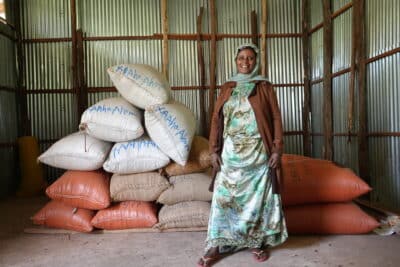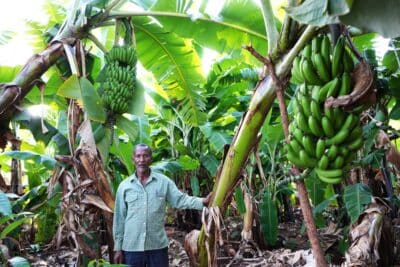Expert view
13 March 2018
Tackling food waste from field to fridge
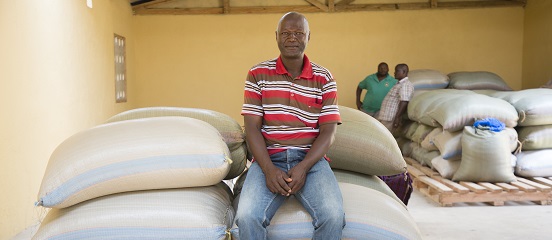
By Libby Plumb, Head of Communications & Advocacy
A carrot that has long lost its crunch and can now be bent into a U. Half a loaf of bread growing spots of mould. Wrinkled potatoes with tentacle-like sprouts. Yet another bottle of gone-off milk.
If this list sounds familiar to you and evokes a pang of guilt at how much of the contents of your fridge and kitchen cupboards end up in the bin, you are far from alone.
Globally, one third of all food is wasted. In total every year, 1.3 billion tonnes of food never get consumed.
Household rubbish bins are just part of the problem. Food is wasted at all points along the supply chain, with big differences in when food is wasted in different places.
In industrialised countries, it’s common for bendy carrots to end up in kitchen bins, with more than 40% of losses happening at retail and consumer level.
In developing countries, on the other hand, food waste mainly happens at the start of the supply chain: food is wasted before it gets to market with 40% of losses occurring at post-harvest and processing levels.
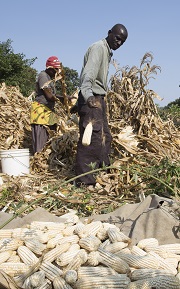 Food is lost in the fields. Crops are eaten by mice or rats while being stored in poorly constructed warehouses. Harvests are condemned by fungal infections when grain is stored without being properly dried.
Food is lost in the fields. Crops are eaten by mice or rats while being stored in poorly constructed warehouses. Harvests are condemned by fungal infections when grain is stored without being properly dried.
Poor roads and transport facilities also reduce the chance of fresh produce staying fresh for long. Two thirds of rural Africans live more than two kilometres from an all-season road.
Post-harvest losses are one of the big factors trapping African smallholders in poverty.
Poor handling practices reduce the proportion of harvests that farmers can sell, while lack of access to storage facilities and transportation forces farmers to sell what they can at the farm gate during harvest time, when prices are at their lowest.
Lower prices in turn undermine incentives for future production, keeping yields low and threatening food security.
According to the UN, if the food wasted in Africa was saved, it could feed about 300 million people.
It’s clear that tackling post-harvest losses is key to driving up smallholders’ incomes and reducing poverty. And with funding from UK aid, that’s just what Farm Africa is doing in Tanzania and Uganda, through our Regional trade of staple foods project.
Working in partnership with FoodTrade ESA, Rikolto and Rural Urban Development Initiatives, Farm Africa is helping tackle food waste right at the start of the supply chain by helping farmers to:
Reduce post-harvest waste
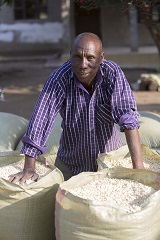 Simple measures like the use of waterproof sacks can reduce the loss of crops at field level.
Simple measures like the use of waterproof sacks can reduce the loss of crops at field level.
John Rejeali a farmer from King’Ori, northern Tanzania, who grows maize, pigeon peas and sunflowers told us: “We have learnt from the project to put the maize cobs in waterproof sacks after taking them off the stalks. Before, we just put the maize on the ground. The quality of the maize is higher now we use the waterproof sacks because it doesn’t get contaminated with soil, sand and thorns.”
Improve drying
Laying crops out on a tarpaulin in the sunshine makes sure that they are dry before they are put in storage, reducing the risk of fungal infections.
Victor Simon Kaaya, 25, the manager of the Uwamale Irrigators and Marketing Cooperative in northern Tanzania said:
“We dry the paddy until it reaches the optimal moisture content. We are waiting until it reaches 13%. We always work two of us together to measure the moisture. It takes 30 minutes maximum to reach optimal moisture content depending on the sunlight.
“We test the moisture content of the paddy by taking a sample of the paddy in a paper cone. Once we have a sample of paddy we spread it out and let it cool for a few minutes before measuring the moisture using the moisture meter.”
Gain access to better warehouses
Moisture-controlled warehouses are offering farmers safe storage for their crops.
Frida Elisante Sarakikya, a farmer living in Maroroni, northern Tanzania, commented: “The village aggregation centre is good because I can leave the maize there and forget about it. I don’t have to worry about rats and mice.”
These measures are increasing the amount of grain available for consumption at home and the surplus available for sale, and enabling farmers to safely store crops for a few months so they can sell outside peak harvest season, contributing towards increasing volumes traded and the price received by farmers.

Photos: Farm Africa / Jon Spaull

